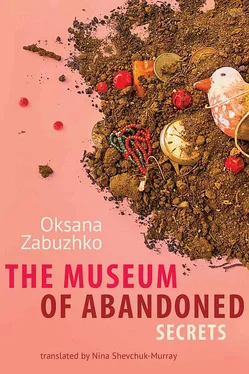“Here’s my paternal great-uncle,” you introduce with a note of involuntary solemnity, or perhaps it just sounds solemn to me, and I define silently: Paternal great-uncle means the brother of your paternal grandfather. My lips stretch idiotically in the smile of a well-brought-up girl who is working hard to be liked by these adults—pleasure to meet you—and suddenly a blinding, shimmering veil of tears slips across my sight, and I hurry to swallow them, blinking them away before you notice because, like all mama’s boys, you automatically interpret a woman’s tears as a personal reproach, instantly growing sullen, as if you’ve been struck, as if, except for you, there is nothing for a woman to cry about in this world. I’m sorry, dear, but I don’t have it in me to resist the numbing spread of this insane, universal tenderness that pools under my skin like blood from a thousand wounds—this visceral, glandular, animal pity for these dead, for their youth, their speech, their laughter no longer audible from where we are, their piercingly pitiful, childlike innocence to the impenetrable gloom that awaits them. Or, perhaps, it is the pity I feel for you and me, for the two orphans abandoned to fend for themselves—like Hansel and Gretel in the dark, dark forest—two lonely shipwrecks washed up onto the shore of the new century by the last, life-draining effort of so many ruined generations of men and women whose only achievement in the long run was to bring us into this world. And on this we ought to congratulate them posthumously, because most of their peers didn’t even manage that.
“Don’t cry.”
“I’m not.”
“Please, what is it?” (with your brooding, almost injured face and your immediate impulse to hold me against your chest, to stroke my hair, to shush).
“It’s okay. It’s over now, I’m sorry.” Let’s go on. To the 1960s chignons and nylon raincoats, to the things that already pop up in our own childhood memories, things that are no longer photographic but fully corporeal, with a feel and a smell: I remember how loudly one of these raincoats rustled when we hid under it in the wardrobe. And, oh, I had a toy bunny just like that, in short pants and a lace ruff! I just can’t remember what it did when you wound it up. Beat on its drum?
Looks like I’m still playing the little girl’s role; and you’ve got the adult part this time: You are the ambassador for all your dead. You do look like you’ve grown older just in the time spent with them, grown out of the lankiness, the floppy-eared-ness of that loose-limbed boy who walked as if scooping up some extra space, and whom I followed with my eyes from behind my window, until he disappeared around the corner, a thread unspooling, only the thread came out of myself—my own body—like a silkworm’s.
Sometimes I am overcome by an almost maternal pride—as if I were the one who brought you into this world, so well put-together, with such relaxed grace in every gesture. The previous generation of “exemplary boys”—those Soviet ones who were destined to be “pioneers,” “Komsomol men,” and then “Communists” (and turned out exactly so)—moved differently, more stiffly, with the implacable military uniformity of the future pyzhyk hat wearers, still so easy to spot in any international airport that one doesn’t have to think twice about coming right up and chatting with them in Russian. And perhaps that’s why I couldn’t ever stand them—those exemplary ones—and why I—the straight-A student with big bows in her hair—gravitated inexorably to the punks, although, of course, you are no punk, and there is no one to whom you could be compared—there were no such boys in the days of my youth; they hadn’t been bred yet. This must be whence my fits of maternal pride, this feeling never known with any man before. Not the “look what I’ve got” feeling on those mornings when I wake up first and, pulling back the covers, stare with hungry curiosity anew at the man stretched out on his back beside me, and weigh, like a merchant, my life’s loot in pounds; and not the blood-bubbling thrill, like a burst of champagne, when I am approaching from a distance and you haven’t seen me yet: “And a man like this loves me!” Not the first, or the second, but a kind of a spellbound, puppy-like wonder, as if I’ve shaken off sleep, rubbed my eyes, and still cannot believe it. Can this be my man, exactly as I imagined him? (And I have always imagined him since my now-distant school days!) So alive, so real, so much more unexpected, nuanced, and interesting than I myself could ever have invented; so big and skillful with his let me do this and really so much better at every task than I am (even at cutting bread—he gets paper-thin, uniformly even slices, a pleasure to behold, while all I can manage are thick unwieldy chunks, lopsided and saw-edged as if a hungry beast mauled the poor loaf). And most importantly (I boast to my girlfriends silently, and then aloud, no qualms whatsoever), most importantly, he does everything with this amazingly natural ease and simplicity that must have something to do with his infinitely touching grace, like a young animal’s—the complete lack of any need, rooted in the body, to pretend to be something other than himself (to march in step, to keep eyes on the head of the man in front, to look the boss in the eyes and lie with an unclouded gaze).
No, I certainly could not bestow upon him this gift of organic dignity, no drawer of my imagination held such a treasure, and never before had I encountered a person who could pass through falsehoods with the same calm ease, emerging utterly untouched by their falsity. Here my contribution amounts to staring in amazement—slack-jawed, like a child at a magician—and pondering how wonderful it is, after all, that it was not I who conjured you! For the first time, practically in my entire life, I can finally say it’s great that I have no control whatsoever over what you are and what you might yet become. Even better, I don’t want any. I am afraid of it; any intervention on my part would be for the worse.
You, naturally, entertain no such notions. Who knows what kind of notions you do entertain about me? Sometimes I get a bit scared—love generally is a scary thing, happy love no less than unhappy, only for some reason no one ever talks about that.
Fear blew through that very first moment when you—smiling as if at an old friend—set out toward me across the bedlam of the TV studio and the chaos seemed to dissipate before you—to disappear from the frame—so irrelevant was it to you as you stepped over the thickets of tangled cords and swerved around treacherous machinery with the grace of a nocturnal animal in the dark woods, and inside me suddenly surged the intoxicating sensation of a mind at the brink of collapse. As if the invisible wall that separates us from chaos slid apart, and one could now expect anything: this new young man of unclear origins could be a psycho, for example, one of those maniacs who keeps calling and lies in wait at the studio entrance—only psychos don’t have such openly childish smiles (and, simultaneously, as if on a parallel track, sped the rueful thought, he must have a girlfriend, a young one, one of those hip ones in a strappy top and tight little pants); and that’s when I heard your voice addressing me and froze for an instant, because you dropped this outrageous question as casually as if we had played in the same sandbox, only you’d stepped out for, oh, thirty years or so, but now you’re back and…
“Have you been looking for me?”
That was a hell of an introduction!
“Why would I be looking for you?” I shot back, quite sensibly, as I willed the cracking wall back into place and the surrounding world into a semblance of normalcy, but the world had already turned—like a dress, inside out—and I saw myself through this young man’s eyes: still in makeup from the recent recording, as if cut out from a TV screen, which always produces in newbies a staggering effect—like the familiar flat picture has been replaced with a 3-D one and alive on top of that (you can try it on for size, see how this woman fits—how she’s just tall enough for the top of her head to brush against your lips). My face like a cream puff, hair brushed smoothly back so that no one would be left ungraced by the sight of my exquisite ears, the rest of me packaged into a leather vest and a white musketeer blouse from Bianco (thanks to the sponsors mentioned in the final credits), with black—and, by the way, seriously tight—jeans. All the cameramen love getting shots of me entering the set from afar, full-length and legs in the frame. You can tell I fixed what I was wearing that day in my memory, forever—that unmistakable sign of all momentous events in our lives—although at that moment, my TV-star getup was strapped on tight like a bulletproof vest, in full combat mode.
Читать дальше












